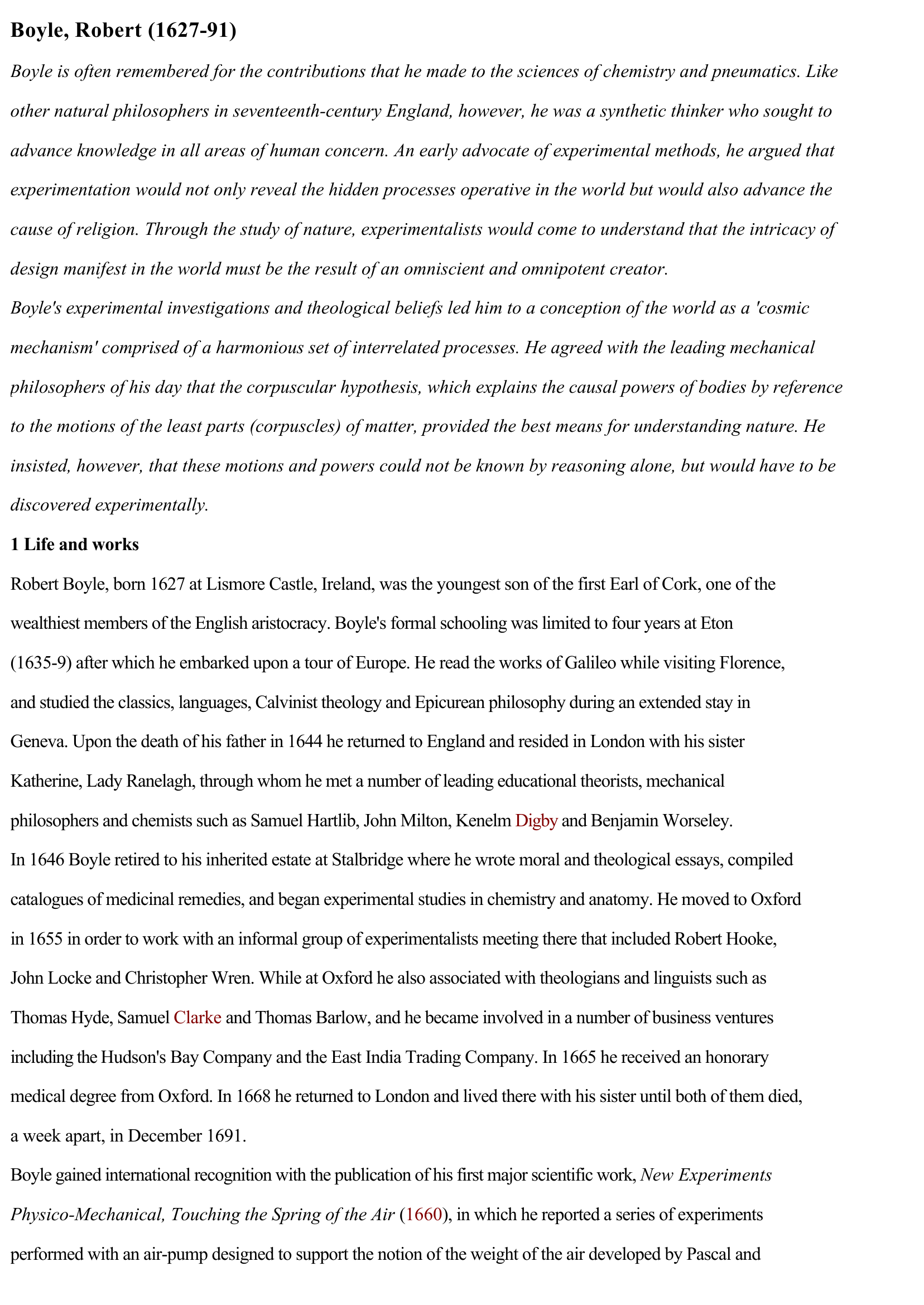Boyle, Robert
Publié le 16/05/2020

Extrait du document
«
Boyle, Robert (1627-91)
Boyle is often remembered for the contributions that he made to the sciences of chemistry and pneumatics.
Like
other natural philosophers in seventeenth-century England, however, he was a synthetic thinker who sought to
advance knowledge in all areas of human concern.
An early advocate of experimental methods, he argued that
experimentation would not only reveal the hidden processes operative in the world but would also advance the
cause of religion.
Through the study of nature, experimentalists would come to understand that the intricacy of
design manifest in the world must be the result of an omniscient and omnipotent creator.
Boyle's experimental investigations and theological beliefs led him to a conception of the world as a 'cosmic
mechanism' comprised of a harmonious set of interrelated processes.
He agreed with the leading mechanical
philosophers of his day that the corpuscular hypothesis, which explains the causal powers of bodies by reference
to the motions of the least parts (corpuscles) of matter, provided the best means for understanding nature.
He
insisted, however, that these motions and powers could not be known by reasoning alone, but would have to be
discovered experimentally.
1 Life and works
Robert Boyle, born 1627 at Lismore Castle, Ireland, was the youngest son of the first Earl of Cork, one of the
wealthiest members of the English aristocracy.
Boyle's formal schooling was limited to four years at Eton
(1635-9) after which he embarked upon a tour of Europe.
He read the works of Galileo while visiting Florence,
and studied the classics, languages, Calvinist theology and Epicurean philosophy during an extended stay in
Geneva.
Upon the death of his father in 1644 he returned to England and resided in London with his sister
Katherine, Lady Ranelagh, through whom he met a number of leading educational theorists, mechanical
philosophers and chemists such as Samuel Hartlib, John Milton, Kenelm Digby and Benjamin Worseley.
In 1646 Boyle retired to his inherited estate at Stalbridge where he wrote moral and theological essays, compiled
catalogues of medicinal remedies, and began experimental studies in chemistry and anatomy.
He moved to Oxford
in 1655 in order to work with an informal group of experimentalists meeting there that included Robert Hooke,
John Locke and Christopher Wren.
While at Oxford he also associated with theologians and linguists such as
Thomas Hyde, Samuel Clarke and Thomas Barlow, and he became involved in a number of business ventures
including the Hudson's Bay Company and the East India Trading Company.
In 1665 he received an honorary
medical degree from Oxford.
In 1668 he returned to London and lived there with his sister until both of them died,
a week apart, in December 1691.
Boyle gained international recognition with the publication of his first major scientific work, New Experiments
Physico-Mechanical, Touching the Spring of the Air (1660 ), in which he reported a series of experiments
performed with an air-pump designed to support the notion of the weight of the air developed by Pascal and.
»
↓↓↓ APERÇU DU DOCUMENT ↓↓↓
Liens utiles
- Robert Boyle.
- Robert Boyle
- Zhu Xiao-Mei, (2007), La Rivière et son secret, éditions Robert Laffont
- Robert Hooke: Micrographia
- C,. E. 26 janv. 1923, de ROBERT LAFRÉGEYRE, Rec. 67


